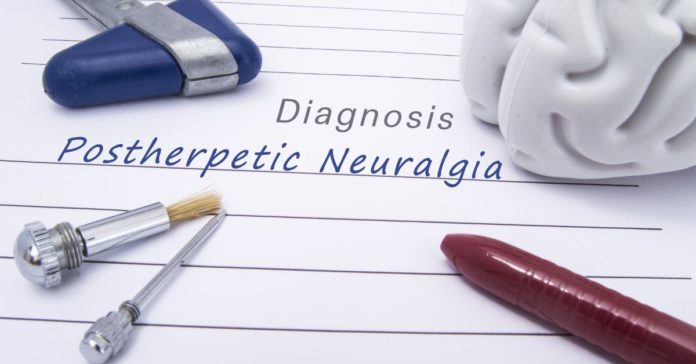Overview
Postherpetic neuralgia is a painful skin condition that develops as a complication of shingles. Typically, people aged above 60 are at an increased risk of developing postherpetic neuralgia. While there is no cure for the condition, treatment can help ease the symptoms.
About postherpetic neuralgia
A common complication of herpes zoster, also known as shingles, postherpetic neuralgia affects the skin and nerves . Postherpetic neuralgia occurs if your nerve fibres are damaged during an outbreak of shingles.
Shingles is a painful skin rash which is caused by the varicella-zoster or chickenpox virus. When the pain caused by shingles does not go away, even after the blisters and rash clear up, it results in postherpetic neuralgia.
What are the symptoms of postherpetic neuralgia?
The symptoms are only limited to the area on your body where the shingles outbreak first occurred.
The common signs and symptoms of postherpetic neuralgia include:
- A burning sensation to the skin, even with a light touch
- Chronic pain that continues for one to two months even after the shingles rash goes away
- Itching or numbness in the affected region
What causes postherpetic neuralgia?
Once you get chickenpox, the virus can remain in your body for a lifetime. However, as your age progresses or if your immune system gets suppressed, the chances of the virus reactivating increase. In some cases, it can cause shingles. In addition, you may develop postherpetic neuralgia if your nerve fibers get damaged during the shingles outbreak. These nerve fibers cannot transmit messages from your skin to your brain. Resultantly, the messages become exaggerated and confused, causing severe pain. The pain can last for as long as several months to years.
When to see a doctor?
If you develop shingles, immediately consult with a doctor. To avoid the complication of postherpetic neuralgia in the future, the doctor may recommend that you take antiviral medications within 72 hours of developing shingles.
Call 1860-500-1066 to book an appointment
What are the complications associated with postherpetic neuralgia?
Depending on the severity of your postherpetic neuralgia, you can experience the following complications:
- Lack of appetite
- Trouble sleeping at night
- Sensitivity to touch in the affected region
- Fatigue
- Depression
- Difficulty concentrating due to the intense pain
What are the treatment options available for postherpetic neuralgia?
Generally, no single treatment works to relieve the symptoms of postherpetic neuralgia. But, your physician may recommend a combination of treatment options to help relieve your symptoms.
The standard treatment options include:
Lidocaine skin patches
Your doctor may recommend small skin patches that contain a topical medicine called lidocaine. The patches can be cut and applied on the affected area of your body.
You will have to apply the skin patches directly to the affected area. However, the patches may provide only temporary relief.
Lidocaine skin patches are available over-the-counter. But, it is best you consult with your doctor before getting the patches.
Capsaicin skin patches
These skin patches contain capsaicin, found in chili peppers, which helps in relieving pain. Your doctor will use a numbing medication on the affected area and then apply the skin patch.
After the skin patch is applied, your doctor will monitor your health for about two hours. In some cases, capsaicin skin patches provide relief from pain for up to three months. If this treatment works, you can repeat it every three months.
Anti-seizure medications
Certain anti-seizure medications such as pregabalin and gabapentin can help relieve your pain by stabilizing the abnormal activity in your nervous system.
However, you may experience some side effects to these medications such as swelling in the feet, drowsiness, or unsteadiness.
Antidepressants
Some antidepressant medications such as venlafaxine, nortriptyline, and duloxetine help affect the parts of your brain that play a major role in how your body interprets pain. Your doctor may recommend these medications for the treatment of postherpetic neuralgia.
Common side effects of taking antidepressants for postherpetic neuralgia include weight gain, lightheadedness, and dry mouth.
A few people may need prescription-strength pain medications containing tramadol, oxycodone or morphine. Opioids can cause drowsiness, mild dizziness, constipation and confusion.
Steroid injections
Steroids are injected sometimes into the spine (epidural or intrathecal) for postherpetic neuralgia. But, evidence of effectiveness is inconsistent.
Conclusion
Postherpetic neuralgia is a chronic pain condition. If left untreated, it can cause complications and affect your quality of life. See a doctor as soon as you start to develop mild symptoms.
Frequently Asked Questions (FAQs)
Is postherpetic neuralgia contagious?
Although postherpetic neuralgia is not contagious, but shingles rash is. In addition, the virus can be transmitted from you to someone else who has never had chickenpox.
Can postherpetic neuralgia be prevented?
To prevent your chances of developing shingles and postherpetic neuralgia, doctors recommend taking the Shingrix vaccine. The vaccine is recommended to people aged 50 years or above. It is given in two doses, two to six months apart. Two doses of the vaccine can help prevent your chances of developing shingles and postherpetic neuralgia by 90 percent.
What does the postherpetic neuralgia pain feel like?
Postherpetic neuralgia pain is described as shooting, stabbing, and excruciating pain in the affected region. You may also experience sensitivity to touch.


















